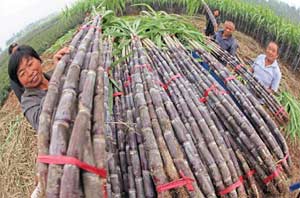A time for giving as hunger stalks a distant land
Updated: 2011-10-14 07:56
By Li Lianxing (China Daily)
|
|||||||||
|
|
|
Famished villagers wait for their share of the 60 tons of maize flour and 5 tons of beans some of them had walked three hours to collect. [Photo/China Daily] |
Future challenges
According to the Food and Agriculture Organization of the United Nations (FAO), the general situation in many parts of the region has improved with the arrival of the rainy season. But there still remain areas where the drought will continue.
"The situation remains dire in Somalia, Djibouti and parts of northeastern Kenya where the refugee crisis is compounding the problems brought on by drought," said Hilary Clarke from the FAO's sub-regional emergency office in central and eastern Africa.
Somalia is the worst-hit country in the region, with 4 million people affected by drought, civil conflicts and high food prices.
Although the WFP is striving to provide cooked meals for more than 100,000 people each day and provided food assistance to roughly 1.3 million people in September alone, the current famine has not yet reached its peak in Somalia and is expected to spread with 750,000 people directly threatened with death.
Soaring international food prices will also significantly worsen food insecurity in the region for the foreseeable future
"For the pastoralists who live in the drought-affected areas, even if livestock are healthier because of improved pasture, they still lose out as they can buy less cereal per animal compared to last year," Clarke said.
UN agencies on Monday released a report indicating that high food prices are likely to continue and possibly increase over the next decade. Thus small states and import-dependent countries, particularly in Africa, are the most vulnerable to poverty and food insecurity, according to the UN.
The FAO said a sustainable approach to the crisis must incorporate long-term development needs.
Rierson from the WFP China office said the WFP seeks to continue its successful partnership with the Chinese government as a development partner, "to get the Chinese government, governments in Africa, and the people of the Horn of Africa to leverage the WFP's deep presence not only for emergencies, but to help rebuild after the famine - using many of the same rural development techniques that were successful in China".
"The difficulty for any country in making a contribution in this area is to translate expert advice into a practical growth in food production," said David Anderson, professor in African politics at the University of Oxford in the United Kingdom.
"What China needs to do is to find ways of implementing improved policies on a scale large enough to make a difference."









